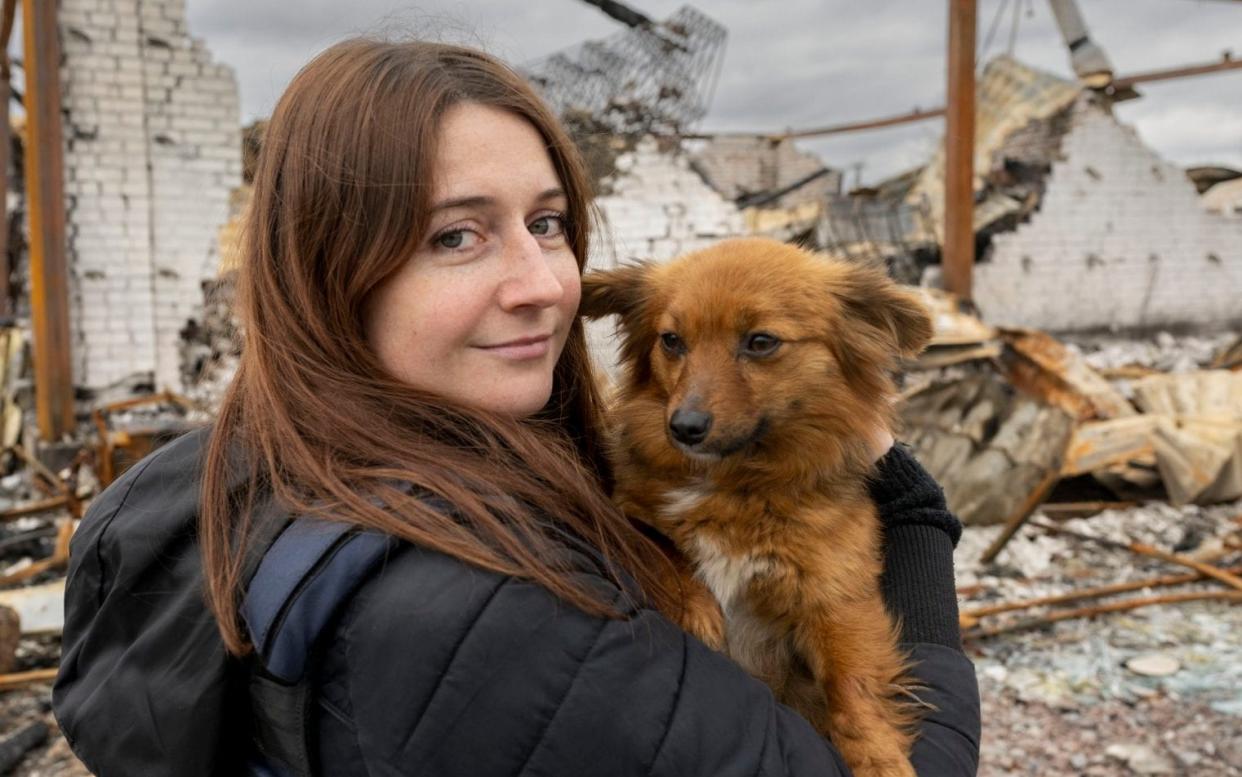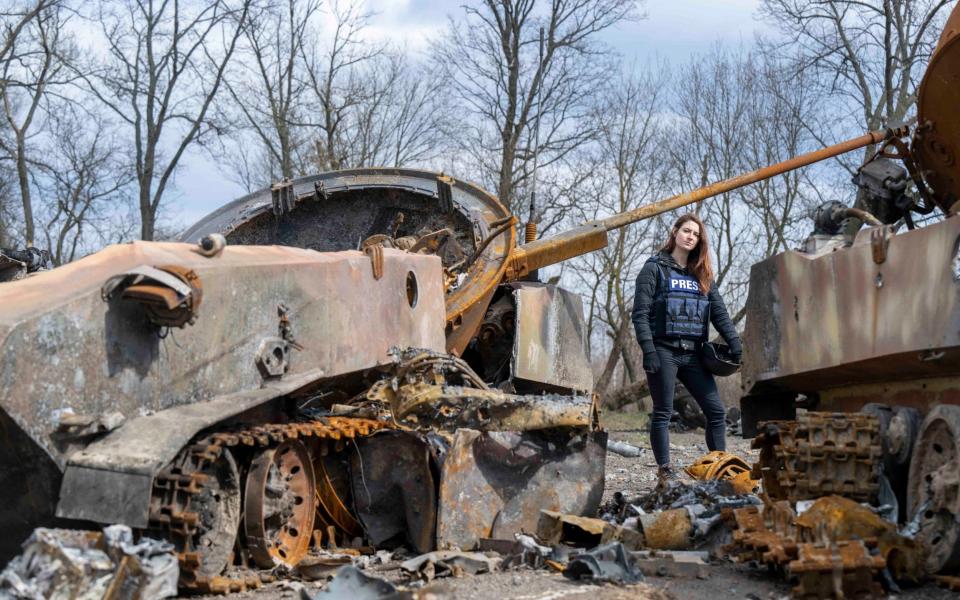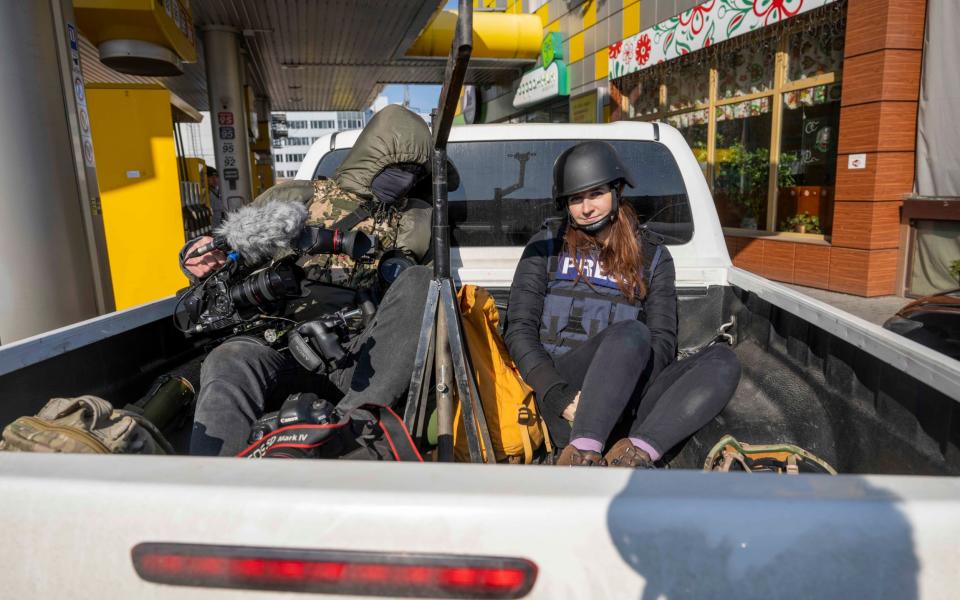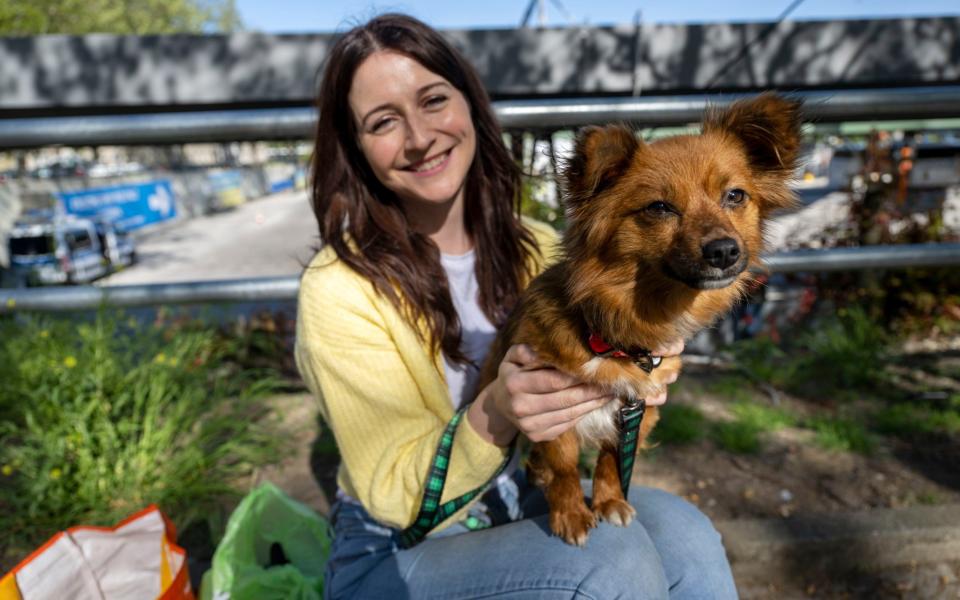'I went to war - and came back with a dog'

If you had to leave your home and all your worldly belongings in an instant to run for your life, as thousands of Ukrainians have, what would you grab? Money, your passport, some spare clothes?
For many Ukrainian families, the one thing they could not leave behind was their pets. Pictures have emerged of refugees carrying cats, dogs and birds as they rush to safety.
But those animals that were abandoned roam the streets in search of food and love. One of these much-loved pets found me, while I was reporting in Ukraine, and I could not leave that dog behind.
This is my story of how I came back from war with a friend for life, one who helped me cope with the reality of a warzone.
Before I left Islington for Ukraine, I could have never imagined the experience. The stories of destruction I found are so devastating that I struggle to comprehend how this is happening in the 21st century. Genocide. War crimes. Invasion. Yet, when entering Ukraine back in February, this is exactly what I found.
To get there, I first flew with Telegraph photographer Paul Grover to the Polish capital, Warsaw, before a nine-hour drive to the border. Then, two hours on to Lviv, a city in the west where thousands of displaced citizens were massed. The threat of missile strikes was constant, coupled with the pressure of getting to our hotel before the curfew. Lviv had been considered the safest place in Ukraine, but the day before we arrived, Russia had fired a missile on the city. It showed how unpredictable this war is and I felt guilt towards my friends and family who were nervously WhatsApping me for reassurance.
Once in Lviv, apart from the sound of sirens, it was hard to believe Ukraine was at war. People hung out in coffee shops and sold tulips on the side of roads. Yet it was inside the refugee centres – the churches offering shelter for the homeless and the crowded train stations where desperate civilians waited – where the true picture emerged.

At an arts centre transformed into a refugee hub providing warm meals, hot drinks and nappies, was Anna. The 32-year old had been excited about her first pregnancy but when the shelling started in the Kherson region where she lived with her husband, they fled. She refused to let herself cry because it stopped her breasts producing the milk she needed for her newborn. I found myself thinking of one of my sisters; how lucky she was to have had her first pregnancy safely at home, with all the family around her.
Over a Skype interview, I spoke to Emir, a member of the Azov regiment who was embedded deep within Mariupol. In fluent English, he tells me he will die fighting for Ukraine. He has a glass eye and lost a hand fighting the Russians in 2014. For weeks after the interview I checked his WhatsApp status to see when he was last online, as proof of life. I still do that now.
After I’d completed a week in Lviv, I woke up on Sunday morning and saw images from Bucha, close to Kyiv, of corpses in the street. A man, face down, in jeans and a hoodie. I guessed he was in his 20s, or 30s. I called the newsdesk and told them I wanted to report on the territories that were opening up, and the atrocities the Russians had committed during the occupation.
Once in Bucha, we see bodies pushed to the sides of roads. An old man lies beside his bicycle. Inside a mass grave behind a church are the corpses of 60 civilians. I stare obsessively at the ground as we walk, terrified I will step on a mine. Down one street, a Ukrainian military police officer finds an unexploded grenade. He shows me looted houses destroyed by Russians. I go inside the building the invaders used as their headquarters and survey the squalor. It looks like a crack den, with empty alcohol bottles, cigarette butts and mouldy food carpeting the floor.
After leaving Bucha I did not stop shaking for hours. I thought it was because I was cold, despite my thermals, and ran a bath that evening, listening to Ariana Grande to take my mind off of what I’d seen. When I talk to my brother later, he explains the cold sensation was adrenaline, pumping round my body in reaction to what I’d seen.
Bucha set the benchmark for how devastating every story we worked on would be.
When we go to the town of Borodyanka, I am speechless at the destruction. It is hell. Apartment blocks razed to the ground by rocket strikes. The remains reveal the normal lives of former occupants: the peach wallpaper of someone’s bedroom, a shower curtain. Among the rubble, there are intermingled cosmetics, clothing and children’s toys. Bodies are beneath the wreckage. I find myself muttering “Jesus Christ” over and over.
In the village of Andriivka, I found evidence of war crimes the Russians were intent on committing: a mass grave dug into Tetiana Oleksiienko’s garden. She sobbed on my shoulder as she recounted how the Russians had threatened to bury her in that pit. I stop the interview to calm her down. Later that day, I embrace a man who breaks down as he tells me how he knew of children the Russians had raped. I normally set myself boundaries when I interview people, but these go out the window and I just cuddle them.

It was here that I found Andi. The small village some 40 miles outside of Kyiv had been occupied by the Russians since early March, who had all but razed it to the ground. Houses no longer resembled homes but piles of rubble. The chilling words “Beware, Mines” had been spray-painted on fences that once guarded homes, while unexploded artillery lined the pavements.
Paul and I had entered a blown-up house when he felt a scratching at his leg, looked down and found a little dog, all red fur and big eyes, staring up at him.
He called me over to look at her and I immediately scooped her up from the rubble and hugged her tight to my chest. The way she responded to me, which was to lick me all over my face and bury her head into my chest, made me feel like she had been deprived of this attention.
I knew trying to take her home was reckless. We had not long been in Ukraine and I had decided to leave the place I was renting back in the UK, so I didn’t even have a home of my own to go back to. We also had a lot of work to do and having an animal cutting around with us would be a logistical nightmare. Yet, there was something about this little girl that stopped me thinking logically and setting her back down among the rubble felt out of the question. Our translator began making inquiries around the village to find out if this dog belonged to someone.

A local called Vladimir, who was surveying the damage to his home when we found him, explained that she had turned up on Day 1 of the invasion, and although he had been feeding her, he had no idea where she came from. He said he had three other dogs he was looking after and he had noticed she had been picked on by some of the bigger dogs.
“If you can give her a better home, you should,” he said, wiping away tears as he buried his head into hers while I held her in my arms. I suspected he was not crying necessarily about the dog, but the fact something had the chance to leave this decimated village and start again.
“Do you want to come to London with me?” I whispered to her. She started licking my cheek again and I knew in that moment that was it. I was bringing her home. Therein began a whole raft of logistics which I had to do alongside my day job, from visits to the vets to get her microchipped and vaccinated against rabies, to scouring the Government’s website to ensure I’d meet the requirements to bring her into the UK. We found a volunteer called Iryna, a woman who had moved to Kyiv after her home had been bombed in Irpin, who was willing to look after Andi at her apartment so that I could carry on reporting without worrying about her being stuck in my hotel room.
Despite the distance, we continued to check in on Andi during our time in Ukraine.
When we came to leaving the warzone, the plan had been for another volunteer to drive Andi to the Polish border, where I would collect her and bring her home.
However, just as the plan was firmly taking shape, a missile that struck the capital 350 metres from the apartment she was staying in meant the plan changed as Iryna, with Andi in tow, fled to Germany.

I remember getting the WhatsApp from her of the billowing smoke from her window and a message explaining that Andi was “squealing and shaking from the strike”. “She won’t come out of the wardrobe,” she’d texted. I felt so sad and I worried that the worst would happen and Andi and Iryna would not make it safely out of Ukraine. Yet, they did.
One Sunday, Paul and I set off to meet them both from London at 4am and travelled to Berlin via Calais to bring Andi home.
To describe how I felt when I saw Iryna walking off that bus with Andi – short for Andriivka – in her arms is almost impossible. There are no words. It felt like one truly special thing had come out of the hardest story I have ever reported on.
Listen to Danielle Sheridan talk about adopting Andi and her experiences in Ukraine, in the most recent episode of Ukraine: The Latest, The Telegraph's daily Ukraine podcast, using the audio player at the top of this article or on Apple Podcasts, Spotify or your favourite podcast app.

 Yahoo News
Yahoo News 
